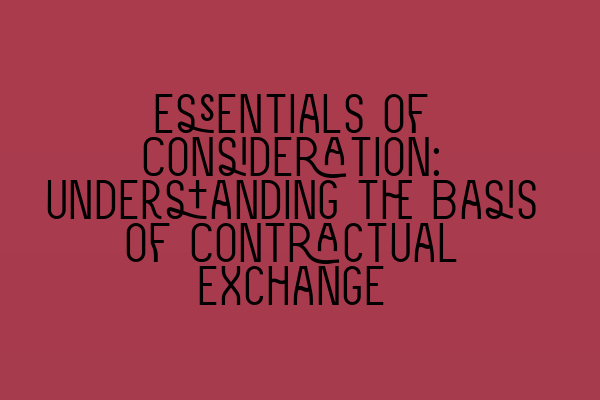Essentials of Consideration: Understanding the Basis of Contractual Exchange
Welcome to SQE Contract Law, where we aim to provide comprehensive insights on a wide range of contract law topics. In this article, we will unravel the concept of consideration, which is an essential element in the formation of a contract. Understanding consideration is crucial for anyone involved in contract law, whether you are a business owner, a solicitor, or a law student. So, let’s delve into this fundamental concept without further ado.
What is Consideration?
In contract law, consideration refers to something of value that is given or promised by one party to another as part of a contractual exchange. It is an essential element that distinguishes a binding contract from a mere promise. Consideration can take various forms, including money, goods, services, or even a promise to do or refrain from doing something.
To illustrate this concept further, let’s consider a hypothetical scenario. Suppose you own a car dealership, and a customer approaches you to buy a car. In this case, the customer’s payment for the car would be the consideration provided by them, while the car itself would be the consideration provided by you. This mutual exchange of consideration forms the basis of the contract of sale.
The Elements of Consideration
For consideration to be valid, it must fulfill certain criteria:
- Legal Value: Consideration must have some measure of legal value. This means that it must involve either a benefit to the promisor or a detriment to the promisee. The law does not concern itself with the adequacy of consideration; it is the presence of legal value that matters.
- Bargain for Exchange: Consideration must be given or promised in exchange for the other party’s promise to do or refrain from doing something. It should be the result of a mutual agreement between the parties involved.
- Contracts under Seal: In some jurisdictions, a contract under seal may not require consideration to be enforceable. However, it is essential to consult local laws and regulations to determine the specific requirements in your jurisdiction.
These essential elements ensure that consideration is valid and enforceable in a court of law. By meeting these criteria, parties involved in a contract demonstrate their intention to be bound by their promises.
The Importance of Consideration
Consideration serves several vital purposes in contract law:
- It acts as evidence of party agreement and mutual intent to enter into a legally binding contract.
- It prevents gratuitous promises from being enforceable as contracts, thus protecting parties from unfair obligations.
- It promotes fairness and prevents the exploitation of one party by the other.
Understanding the importance of consideration enables parties to negotiate contracts with clarity and confidence, ensuring that their rights and obligations are protected.
The Role of Consideration in Contractual Disputes
The concept of consideration becomes especially significant when disputes arise regarding the validity or enforceability of a contract. Having a clear understanding of consideration allows parties to effectively argue their case in court, demonstrating the existence of a bargained-for exchange and valuable consideration provided by both parties.
When facing contract disputes, it is crucial to seek professional legal advice to navigate the complexities of the law. Our team of experienced solicitors at SQE Contract Law is dedicated to providing expert guidance and representation to ensure the best possible outcome for our clients.
Further Reading
If you found this article helpful and would like to explore related topics, we recommend the following articles:
- Interpreting Contractual Clauses: Unlocking the Hidden Meanings
- Agreements in Contract Law: Understanding Its Various Types
- Contract Law Tutorials: Simplifying Complex Concepts for Students
- Discharge of Contracts: Modes and Consequences Explained
- Exploring Third Party Rights in Contract Law: Implications and Boundaries
We hope you found this article informative and useful. If you have any further questions or require legal assistance, please don’t hesitate to contact SQE Contract Law. Stay tuned for more in-depth articles on various aspects of contract law.
